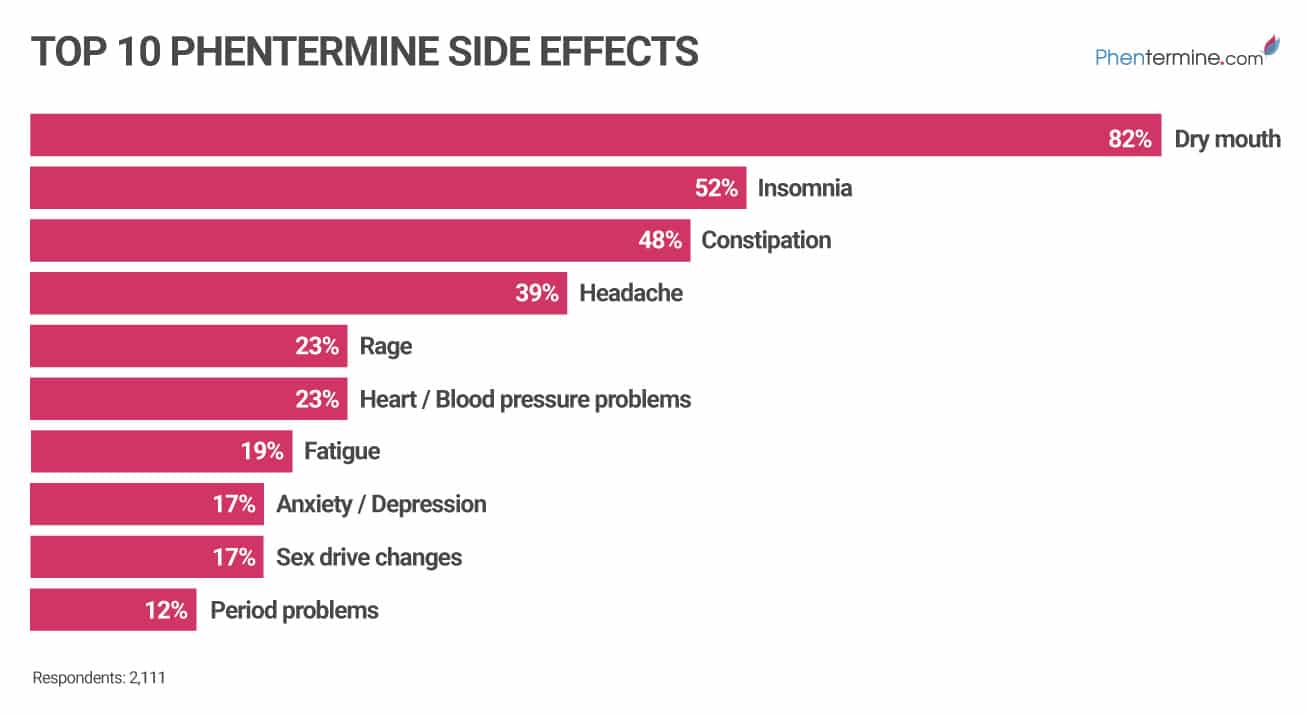Understanding Phentermine and Dry Mouth: Causes, Effects, and Remedies
Phentermine is a widely-used weight loss medication that helps suppress appetite and boost energy levels.
However, a common side effect of phentermine is dry mouth, or xerostomia, which can cause discomfort and oral health issues. Understanding and managing this side effect is crucial for maintaining overall health and comfort during your weight loss journey.
Does Phentermine Cause Dry Mouth?
Yes, dry mouth is phentermine’s most common side effect. (
According to a recent online poll, 80% of phentermine users experience this uncomfortable condition. This makes it 30% more common than the next most reported side effect, insomnia.

Causes of Dry Mouth
Phentermine causes dry mouth by increasing the levels of epinephrine and norepinephrine in the body. These neurotransmitters are responsible for the stimulant effects of phentermine, which include increased energy and alertness. However, they also instruct the body to focus resources away from non-critical functions, like saliva production. This decrease in saliva causes the feeling of dryness in the mouth, lips, and tongue. (
Interestingly, this mechanism is similar to the dry mouth experienced during nervousness or fear. In both cases, the body prioritizes other functions over saliva production, resulting in a dry mouth.
Symptoms and Complications of Dry Mouth
Common Symptoms
Patients frequently suffer from persistent dryness in the mouth, lips, and tongue, leading to bad breath and a sore throat. The lack of moisture in the mouth provides an ideal environment for bacteria to thrive, contributing to bad breath. Furthermore, the dryness of the surrounding tissues can lead to discomfort and soreness in the throat.
Potential Complications
Dry mouth can increase the risk of oral yeast infections, such as thrush or candidiasis. These infections usually appear as white, clumpy plaques but can also be red and irritated. While pain or changes in taste are possible, they are rare.
Prolonged dryness can also cause dental issues like cavities and sores. The lack of saliva, which usually helps neutralize acids and wash away food particles, speeds up the development of dental decay and other oral health problems.
To reduce these risks, it’s essential to have regular dental check-ups and maintain good oral hygiene.
How to Treat Dry Mouth

Hydration
It’s essential to stay hydrated to manage this phentermine side effect. Drinking plenty of water helps moisten your mouth and alleviates the uncomfortable “cotton mouth” feeling. Carry a water bottle with you and take frequent sips throughout the day to ensure you stay hydrated. This not only helps with dry mouth but also supports overall health and weight loss efforts.
Dietary Adjustments
Incorporating foods with high water content into your diet can help manage dry mouth. Fruits like watermelon and vegetables such as cucumber are excellent choices.
Additionally, avoiding caffeinated and sugary drinks is wise, as they can lead to further dehydration. Opt for water or herbal teas instead to maintain hydration without the diuretic effects of caffeine.
Oral Care
Chewing sugar-free gum or mints can stimulate saliva production, temporarily relieving dry mouth.
Maintaining good oral hygiene by brushing, flossing, and visiting the dentist regularly is also essential. This helps prevent dental issues that can be worsened by dry mouth, such as cavities and sores.
Environmental Adjustments
Using a humidifier can add moisture to the air. This is especially helpful if you live in a dry climate or use central heating. Placing a humidifier in your bedroom can help alleviate dry mouth symptoms while you sleep, making it easier to manage this side effect of phentermine.
Over-the-Counter Remedies
If home remedies are ineffective, consider using over-the-counter saliva substitutes or mouthwashes designed for dry mouth relief. These products can offer temporary relief and are a convenient option for managing dry mouth symptoms.
When Does Dry Mouth Go Away?
The severity of xerostomia varies from person to person, but most patients report improvement in symptoms after 1-2 weeks of treatment. Staying adequately hydrated can also help alleviate some of the most bothersome symptoms.
When to Seek Medical Advice
Consult a healthcare provider if you have a persistent dry mouth while taking phentermine.
Prolonged dry mouth can lead to complications like oral yeast infections, dental decay, and bad breath. Regular check-ups with your dentist and doctor can help monitor and manage these symptoms. If dry mouth persists despite at-home remedies, seek professional medical advice.
Sometimes, your healthcare provider may suggest adjusting your phentermine dosage or recommend over-the-counter remedies like saliva substitutes or mouthwashes. Always discuss any changes in your medication regimen with your healthcare provider to ensure safe and effective treatment.
Conclusion
Managing dry mouth while taking phentermine is crucial for maintaining oral health and comfort. You can effectively combat this common side effect by following the outlined strategies, such as staying hydrated, using sugar-free gum, and maintaining good oral hygiene.
If issues persist, consult your healthcare provider for additional support. Balancing the benefits of phentermine with managing its side effects is vital to achieving effective weight loss and overall well-being.
- Cosentino, G., Conrad, A., & Uwaifo, G. (2011). Phentermine and topiramate for the management of obesity: A review. Drug Design, Development and Therapy, 267. doi:10.2147/dddt.s31443
- Miranda-Rius, J., Brunet-Llobet, L., Lahor-Soler, E., & Farré, M. (2015). Salivary Secretory Disorders, Inducing Drugs, and Clinical Management. International Journal of Medical Sciences, 12(10), 811-824. doi:10.7150/ijms.12912

